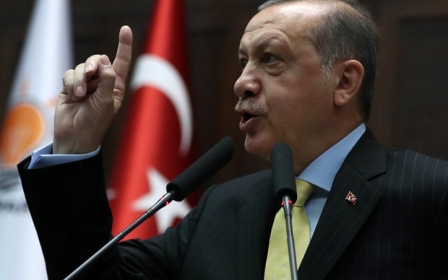Erdogan and EU talks end with little headway

The EU on Monday said it failed to reach any "concrete solutions or compromises" with Turkey in talks with President Recep Tayyip Erdogan seeking to repair their tattered relations.
Erdogan held a working dinner with European Union President Donald Tusk and European Commission chief Jean-Claude Juncker in Bulgaria with a litany of issues clouding their discussions.
These include European alarm at Erdogan's crackdown on perceived opponents following a coup attempt in 2016, the arrest of journalists, Turkey's military operations against Kurds in northern Syria and squabbling over Ankara's deal to halt the flow of refugees into Europe.
This has all whipped up an increasingly acrimonious war of words and made Turkey's prospects of joining the EU - an objective that Erdogan insisted earlier on Monday that Turkey still pursues - appear even more remote.
But despite hopes for a breakthrough at the summit in the Black Sea resort of Varna, Tusk said they made little tangible headway.
"I raised all our concerns, as you know it was a long list," Tusk told reporters after the meeting.
"If you are asking me if we achieved some solutions or compromises - my answer is: 'no'," he added. "Our position is clear - only progress on these issues will allow us to improve EU-Turkey relations, including the accession process."
Tusk said improved relations would depend on progress on issues, including the rule of law and press freedom as well as Syria.
But Erdogan struck a more optimistic tone, telling reporters: "We hope to have left the difficult times with the EU behind”.
"Turkey and the EU are long-term strategic partners. It would be a serious mistake for the bloc to push Turkey out of its enlargement politics".
Juncker said the summit was one of "mixed feelings but not mixed messages," adding: "It was a good meeting because as this is the normal principle between big democracies, we were able to talk in all frankness and openness."
Tensions rose further last week after EU leaders condemned Turkey's "illegal actions" towards Greece and Cyprus in the eastern Mediterranean and the Aegean Sea.
Ankara hit back at the "unacceptable comments" and said the EU had lost its objectivity on Cyprus, which is divided between the Greek-majority internationally-recognised Republic of Cyprus and the breakaway Turkish Cypriot north.
In March 2016, Ankara and Brussels agreed on a controversial deal to stop the flow of migrants, in what was seen as a landmark in cooperation and which Turkey hoped would yield visa-free travel to Europe.
So far this incentive has not been realised and Erdogan stressed the issue during the talks.
Last month Turkey said it fulfilled the 72 criteria for visa-free travel and Erdogan told reporters that the necessary paperwork had been sent to the European Commission.
Brussels has also repeatedly criticised the post-coup crackdown, which has seen nearly 160,000 people detained, including dozens of journalists.
Turkey, for its part, has accused Brussels of failing to show solidarity after the coup and appears set on forging a strong partnership with President Vladimir Putin's Russia.
In contrast to Erdogan's brisk evening meeting with the EU leadership, Putin - whose relations with the West have nosedived following the poisoning of a former Russian spy in Britain - is expected to make a full two-day visit to Turkey next week.
Ankara has agreed to buy air defence systems from Russia and Moscow will also build Turkey's first nuclear power station.
Stay informed with MEE's newsletters
Sign up to get the latest alerts, insights and analysis, starting with Turkey Unpacked
Middle East Eye delivers independent and unrivalled coverage and analysis of the Middle East, North Africa and beyond. To learn more about republishing this content and the associated fees, please fill out this form. More about MEE can be found here.




